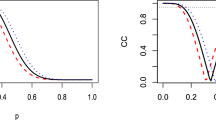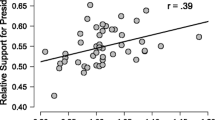Abstract
In the form of inference known as inference to the best explanation there are various ways to characterise what is meant by the best explanation. This paper considers a number of such characterisations including several based on confirmation measures and several based on coherence measures. The goal is to find a measure which adequately captures what is meant by ‘best’ and which also yields the truth with a high degree of probability. Computer simulations are used to show that the overlap coherence measure achieves this goal, enabling the true explanation to be identified almost as often as an approach which simply selects the most probable explanation. Further advantages to this approach are also considered in the case where there is uncertainty in the prior probability distribution.
Similar content being viewed by others
References
Angere S. (2007) The defeasible nature of coherentist justification. Synthese 157: 321–335
Angere S. (2008) Coherence as a heuristic. Mind 117(465): 1–26
Bovens L., Hartmann S. (2003) Bayesian epistemology. Oxford University Press, Oxford
Chajewska, U., & Halpern, J. Y. (1997). Defining explanation in probabilistic systems. In Proceedings of the 13th conference on uncertainty in AI (pp. 62–71).
Douven I. (1999) Inference to the best explanation made coherent. Philosophy of Science 66: S424–S435
Fitelson B. (1999) The plurality of Bayesian measures of confirmation and the problem of measure sensitivity. Philosophy of Science 66: S362–S378
Fitelson B. (2003) A probabilistic theory of coherence. Analysis 63: 194–199
Glass, D. H. (2002). Coherence, explanation and Bayesian networks. In M. O’Neill et al. (Eds.), Artificial intelligence and cognitive science. Lecture Notes in Artificial Intelligence (Vol. 2464, pp. 177–182). Berlin: Springer.
Glass D. H. (2007) Coherence measures and inference to the best explanation. Synthese 157: 275–296
Lipton P. (2004) Inference to the best explanation (2nd ed.). Routledge, London
McGrew T. (2003) Confirmation, heuristics and explanatory reasoning. British Journal for the Philosophy of Science 54: 553–567
Okasha S. (2000) Van Fraassen’s critique of inference to the best explanation. Studies in the History and Philosophy of Modern Science 31: 691–710
Olsson E. J. (2002) What is the problem of coherence and truth? Journal of Philosophy 99: 246–272
Olsson E. J. (2005) Against coherence. Oxford University Press, Oxford
Psillos, S. (2004). Inference to the best explanation and Bayesianism. In F. Stadler (Ed.), Institute of Vienna circle yearbook (Vol. 11, pp. 83–91). London: Kluwer.
Shogenji T. (1999) Is coherence truth-conducive? Analysis 59: 338–345
Treagar M. (2004) Using explanatory factors in induction. British Journal for the Philosophy of Science 55: 505–519
van Fraassen B. C. (1989) Laws and symmetry. Clarendon Press, Oxford
Weisberg J. (2009) Locating IBE in the Bayesian framework. Synthese 167: 125–143
Author information
Authors and Affiliations
Corresponding author
Additional information
This is a revised and extended version of a paper which was published in the proceedings of the Symposium on Computing and Philosophy at the AISB 2009 Convention in Edinburgh in April 2009.
Rights and permissions
About this article
Cite this article
Glass, D.H. Inference to the best explanation: does it track truth?. Synthese 185, 411–427 (2012). https://doi.org/10.1007/s11229-010-9829-9
Received:
Accepted:
Published:
Issue Date:
DOI: https://doi.org/10.1007/s11229-010-9829-9




